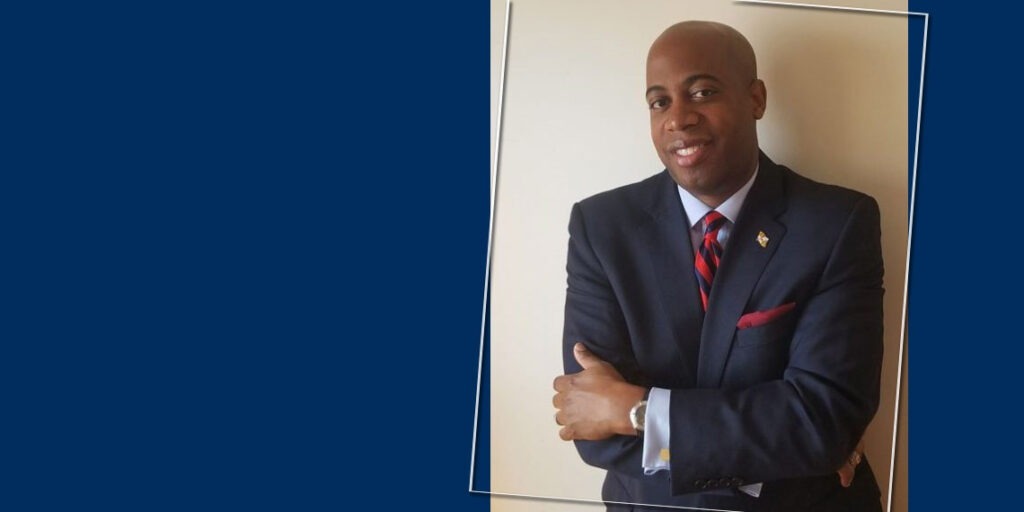UMW alumnus Judge Miller gives Black History Month keynote address
4 min read
Judge Kerwin A. Miller, a 1995 UMW graduate, went on to be the first Black male attorney in Maryland's ninth district. | umw.edu
by PRIYA PATEL
Staff Writer
On Feb. 10, the University of Mary Washington hosted Judge Kerwin A. Miller as the speaker for the 2021 Black History Month virtual keynote program. The James Farmer Multicultural Center and the Black Student Association hosted the event.
The virtual format of the event created a different experience from previous years, attendees said.
“I wish the event could have been in person so I could personally meet Judge Miller. However, I’m glad that we adapted to the COVID world and still were able to have the event,” said Michael Tucker, sophomore business administration major and a member of the Black Student Association. “I’m sure many enjoy the convenience of joining the event on their computer rather than having to physically go somewhere. I’m glad the event still impacted me and others in a positive way despite it being virtual.”
Miller is from the Bronx, N.Y., but came to Virginia to attend Mary Washington College and graduated in 1995. He talked about how he enjoyed his time on campus and even takes yearly visits with his family to walk around the campus. He gladly agreed to be the keynote speaker for this event.
Jordan Providence, sophomore English major and the president of the Black Student Association, believes that Miller was a great choice for the event.
“He is a UMW alumni, the first black male attorney at Cecil County State’s Attorney’s Office and the first Black judge in District 9, Hartford County in Maryland,” Providence said. “He is a creator of history for Black people everywhere. To be honest, it was a blessing that we were even able to have him as our keynote speaker, considering how qualified he is.”
Miller started his speech by talking about himself and what the world was like for him growing up and during his time at Mary Washington College. He went to high school during the cocaine crisis and the Central Park jogger case, where five Black and Latino teenagers were falsely accused and convicted of the rape and aggravated assault of a white woman. The case led to a spike in racist portrayals of Black teenagers by the media.
Tucker has noticed some changes since Miller’s time at what is now the University of Mary Washington.
“I think things have most certainly changed since the ‘90s. For starters, Judge Miller stated that there were about four or five African Americans in his class, and eventually more entered college as years went by. Looking at the university today, there are most certainly more POC, and diversity is encouraged,” he said “It was still a culture shock for me when I entered UMW which I am sure many [People of Color] can relate to,” he said. “There are not many people that look like me, but there are some.”
Miller also spoke about some negative experiences with the Fredericksburg Police during his time in college. This was a topic that the attendees were particularly interested in and asked him questions about. Despite his negative experiences at Mary Washington College, Miller does not hold it against the current university.
“Regarding the Fredericksburg Police, I think things have changed for better, just not as much as many would hope, including myself,” Tucker said. “At the end of the day, change is gonna come, but at what rate?”
William Moore, a junior communication and digital studies major and another member of the Black Student Association, agreed that there has been change.
“I believe that it has definitely changed just speaking on what I’ve experienced,” Moore said. “Most of the law enforcement that I’ve met while being here is very approachable and nice.”
Miller talked about his career as a prosecutor, judge and later an adjunct professor. He was eventually appointed by Maryland’s Governor Larry Hogan to serve as an Associate Judge in District 9, Hartford County in Maryland.
“Hearing about Judge Miller’s achievements affected me in a positive way,” Tucker said. “I love to hear when others have done well in life and have achievements that help represent their success. Honestly, the way he carries himself and speaks influences many. Before he even mentioned his achievements, I thought to myself ‘dang I can really learn something from him.’ I’m sure my peers and other attendees thought the same thing.”
Judge Miller talked about three factors that are necessary to light the path forward: encouragement, engagement and empowerment. He told the attendees that real change starts at the local level.
“A major key that I took away from his speech is that we have to live in today,” Tucker said. “Meaning that we have to make the most out of each day. We can’t dwell on the past nor is tomorrow promised, so we have to better ourselves each day. We have to stop putting things off and really work towards our goals. Also, I totally agree with change happening at the local level. We have to get to know our local officials for change to truly occur.”
“Our local authorities are what we are closer to, so why not make necessary changes at home,” Moore said. “That would make our battle a little easier.”
Providence also felt like she learned a lot from Miller’s speech.
“The most important point that I took away is that it is important to always stay true to yourself and your heritage no matter what position or career you choose to pursue,” she said. “Another point I took away is to not be afraid to be the first to do something.”
Moore said he benefits from Miller’s story.
“Judge Miller, being a man of color, gave us the opportunity to dive into his story and then gave us necessary tools to utilize in our battle for fighting racial injustice,” Moore said.











